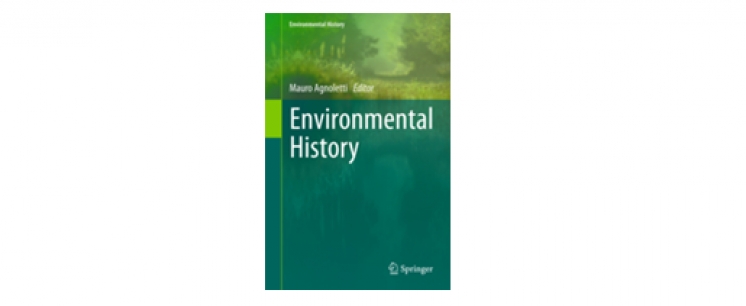Call for Book Chapters - Histories of Bioinvasions in Mediterranean-type regions
- Written by REPORT(H)A
- Published in News
Editors:
Queiroz, Ana Isabel. Institute of Contemporary History, FCSH, Univ. NOVA de Lisboa, Portugal.
Pooley, Simon. Department of Zoology, University of Oxford, United Kingdom.
Publisher:
The book will be published by Springer in the Environmental History series which is edited by Mauro Agnoletti.
June 1, 2016: Submission of abstracts (500 words)
Theme:
Bioinvasions is a research topic that brings together academics from the areas of Biology, Social Sciences and Humanities in order to understand the complex processes of prevention, introduction, diffusion and mitigation. Natural science studies approach the biological features that allow some species, at some times and in some places, to become invasive. Cultural studies show how values, ideas and perceptions facilitate the transfer of organisms, and how societies are affected by harmful species in particular moments. As a research topic, bioinvasions requires a permanent dialogue between biological studies and the study of the relationship between humans and nature.
This book proposes a historical approach to bioinvasions, whether contributed by environmental scientists, social sciences or humanities scholars. It will focus on human agency and responses to the introductions, outbreaks and damages caused by invasive species. It will address species of all taxa, wherever their proliferation forced human societies to act or to adapt. It could deal with alien or native species where and when they were affecting biodiversity, and having socio-economic and cultural impacts. Papers needn't be focused on a single species or even genus. They can take a systemic view, either of biological impacts or human responses.
This publication will focus on Mediterranean systems worldwide: from the Mediterranean basin, through California, Chile and South Africa to Australia. These regions are both highly dispersed around the globe, and also show a high degree of convergent evolution in response primarily to similar climatic conditions. Hotspots of biodiversity, they have also by virtue of their climatic similarities to some of the key seafaring and colonising nations of Western Europe, endured a long history of colonisation and cultural and environmental transformation. This has been exacerbated in more recent times by the rise of air travel and international tourism. One of the goals of this book is to offer comparative perspectives on these dispersed and yet in some ways similar regions, considering both international and local processes and influences, similarities and differences.
Target audience:
The target audience includes researchers, practitioners and (Masters/PhD) students. Therefore, papers can address both scientific and practical implications of the research.
Type of contributions and length:
- Conceptual papers: Contributions that synthesize existing studies, and/ offer comparative analyses of biological invasions in Mediterranean type systems.
- Full research papers: Both quantitative and qualitative contributions that study a particular aspect of the history of bioinvasions, considering their natural and cultural dimensions.
- Case studies: In-depth reports of successes or failures of actions related to prevent entrance or manage invasions in a particular area, in a particular time.
Both type of contributions are typically 15 to 20 pages in length (max. 8,000 words, excluding references) when applying the Springer formatting instructions. Contributions should be original and not be submitted elsewhere.
Review process:
There will be a two-stage review process. In the first stage potential authors will be invited to submit an abstract of 500 words. The editors will review the abstract to evaluate if the proposed book chapter (1) fits to the theme of the book, (2) makes a substantial analytical, practical or scientific contribution and (3) is of the appropriate level for the target audience.
In the second stage the selected authors will be invited to submit a full version of the proposed book chapter. (It is expected that the book will have 12 to 15 chapters.) This full version will be peer reviewed by someone expert in the topic of the book chapter, as well as the book editors. The review process by the reviewers (other than the editors) is double blind. Based on the outcome of the review process, the authors will be requested to revise their book chapters based on peer review, and in response to the book editors’ guidance on the emerging themes of the book. If the editors are satisfied with the revision of the book chapter, the authors will be invited to submit a camera-ready version of the paper.
Deadlines:
June 1, 2016: Submission of abstracts (500 words)
July 1, 2016: Invitation to submit full paper
January 5, 2017: Submission of full chapter
February 15, 2017: Review notification
March 15, 2017: Submission of revised paper
April 31, 2017: Final notification of acceptance
May 30, 2017: Submission of final version
Submission and formatting:
Abstracts should be submitted as plain Word (2010 or higher) or PDF files by e-mail to This email address is being protected from spambots. You need JavaScript enabled to view it. and This email address is being protected from spambots. You need JavaScript enabled to view it.. The abstract should contain:
1) Title of the proposed chapter
2) Author(s) of the chapter (including affiliation)
3) Type of contribution (case study, full research paper or conceptual paper)
4) Estimated amounts of pages (excl. references)
5) Abstract of 500 words describing contents of the book chapter (incl. methodology)
6) Keywords (at least 2 and maximum of 5)
Full book chapters will also be submitted through e-mail to This email address is being protected from spambots. You need JavaScript enabled to view it. and This email address is being protected from spambots. You need JavaScript enabled to view it.. Full book chapters need to be formatted according the Springer instructions and submitted in Word (2010 or higher) or PDF format. These formatting instructions will be e-mailed together with the acceptance notification of your abstract. For further questions please contact Ana Isabel Queiroz (This email address is being protected from spambots. You need JavaScript enabled to view it.) or Simon Pooley (This email address is being protected from spambots. You need JavaScript enabled to view it.).

